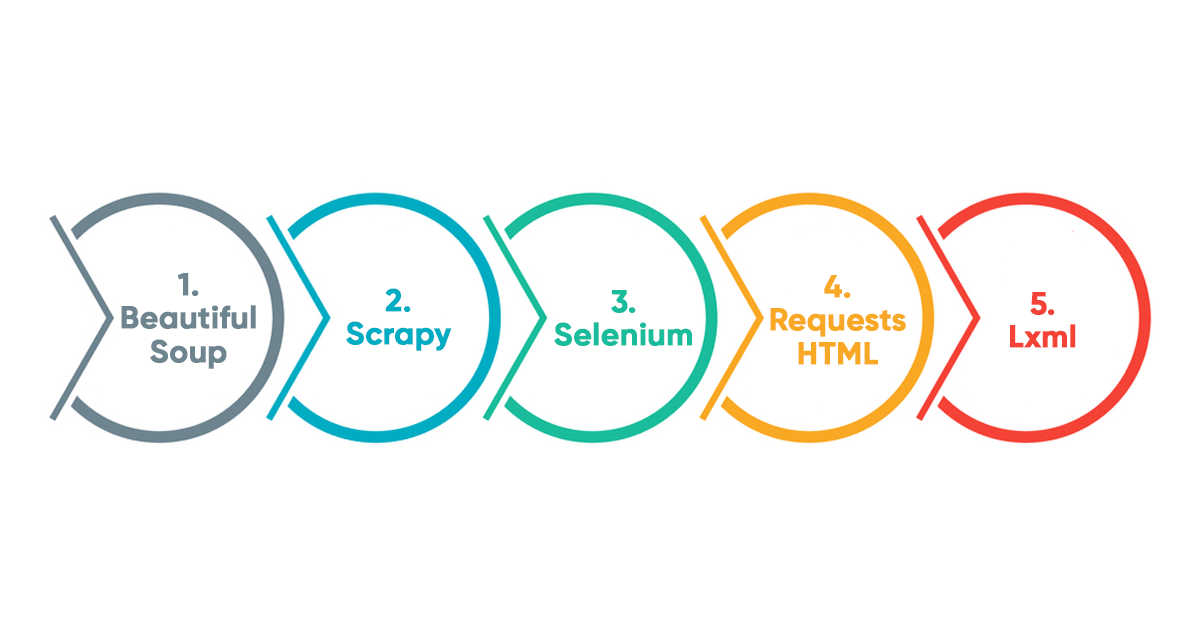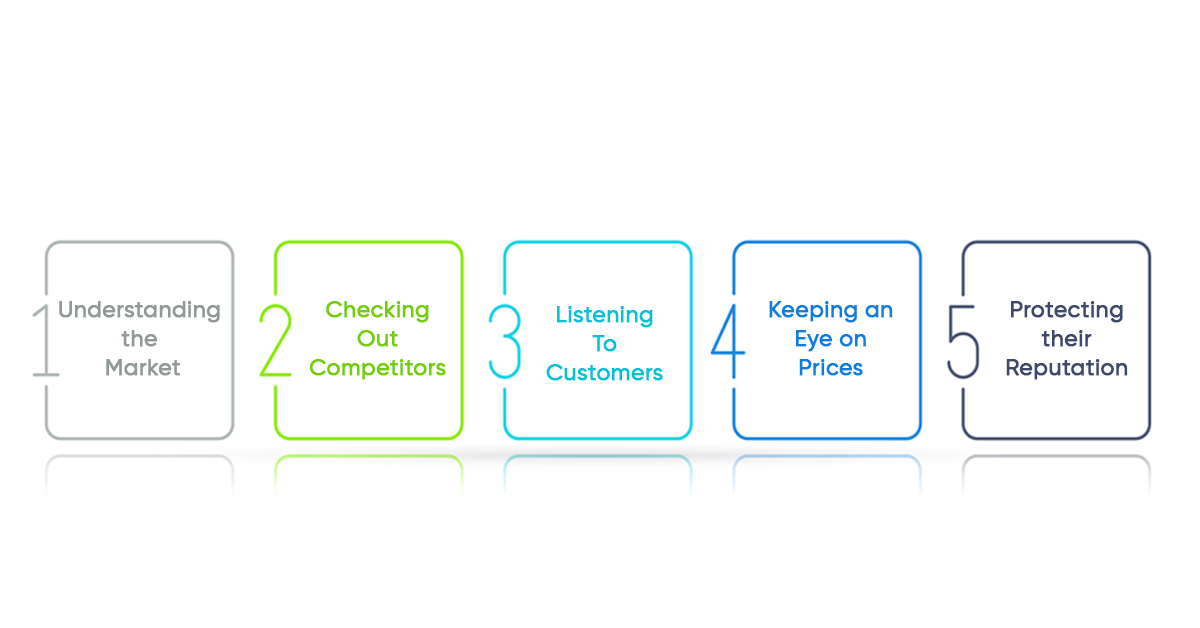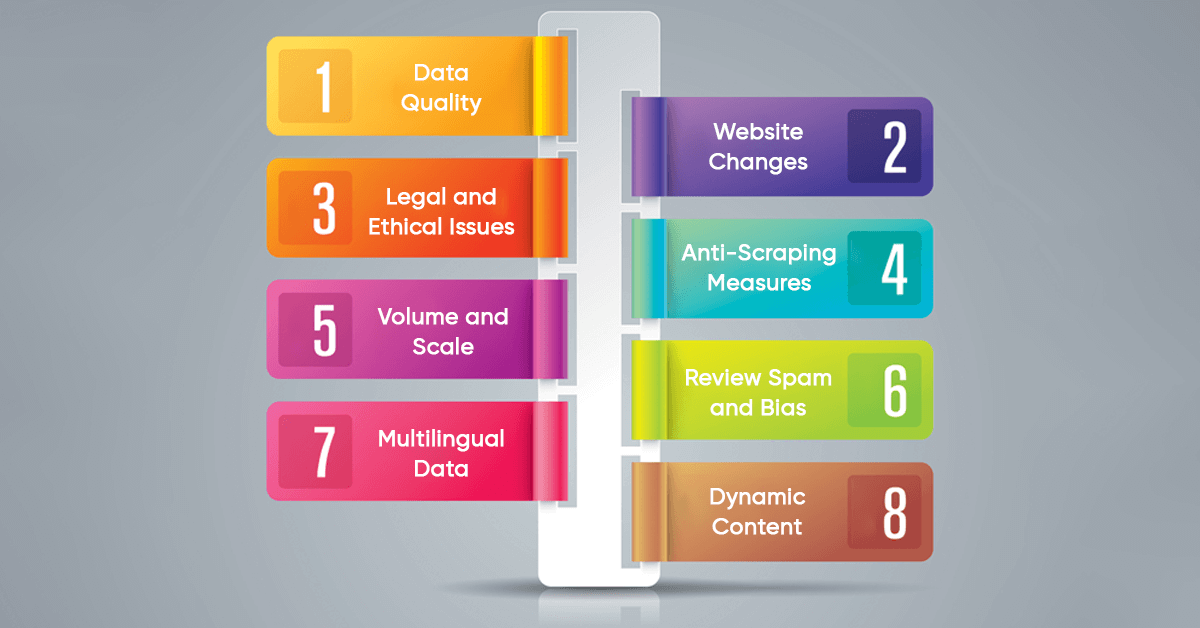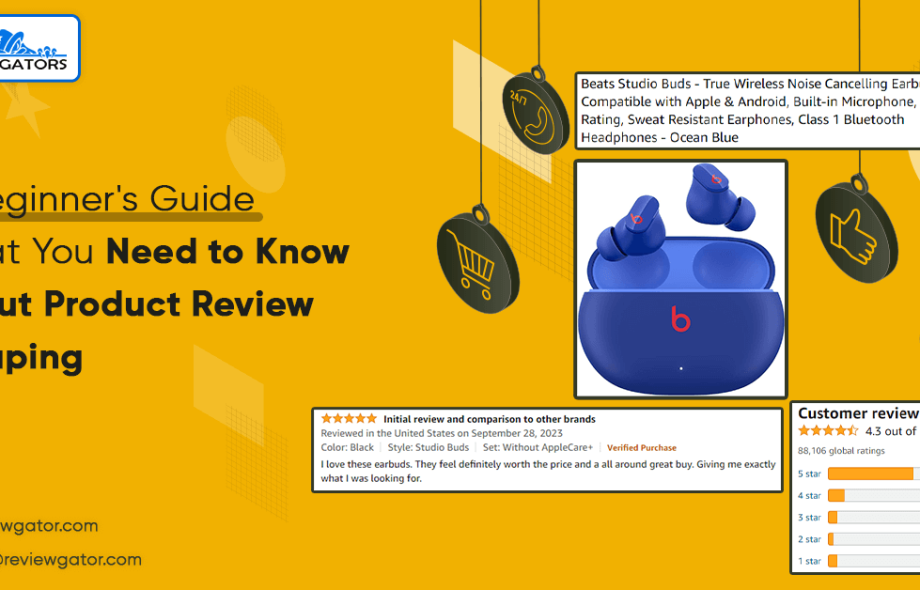Introduction
In the world of online shopping, knowing what customers think about products is crucial for businesses to beat their rivals. Product review scraping is a magic tool that helps businesses understand what customers like or don’t like about products. It’s like opening a treasure chest of opinions, ratings, and stories from customers, all with just a few clicks. With product review scraping, you can automatically collect reviews from big online stores like Amazon or Walmart, as well as from special review websites like Yelp or TripAdvisor.
To start scraping product reviews, you need the right tools. Software tools like BeautifulSoup and Scrapy are like special helpers, and frameworks like Selenium make things even easier. These tools help beginners explore websites, grab the information they need, and deal with tricky stuff like pages that change constantly.
What is Product Review Scraping?
The process of scraping product reviews involves collecting data from various internet sources, including e-commerce websites, forums, social media, and review platforms. Product review scraping can be compared to having a virtual robot that navigates through the internet to gather various opinions on different products from people. Picture yourself in the market for a new phone, seeking opinions from others before making a purchase. Instead of reading every review yourself, you can use a tool or program to do it for you.
The task requires checking multiple websites, such as Amazon or Best Buy, to collect user reviews and compile all comments and ratings for the particular phone. It’s kind of like having a super-fast reader that can read thousands of reviews in a very short time. Once all the reviews are collected, you can compare them to see if people generally like the phone or if there are common complaints. For example, lots of people say the battery life is great, but some complain about the camera quality. This method eliminates the need to read through each review individually to determine which features of the product are great and which ones are not so great.
Tools to Scrape Product Reviews

These Python programs make it easy to gather product evaluations from numerous websites, allowing businesses to gain valuable insights from client feedback. Choosing the best instrument is determined by your requirements and preferences, as each has distinct strengths and purposes.
The popular Python tools for scraping product reviews are:
- Beautiful Soup: It’s like having a magic tool that helps you read and understand web pages. With Beautiful Soup, you can easily find and collect information from websites, making it the best tool for scraping product reviews from ecommerce websites.
- Scrapy: Scrapy acts as a super-fast spider that crawls through websites to collect data. It is ideal for scraping product evaluations from several websites because it can handle large amounts of web pages and extract the information you want.
- Selenium: Selenium is like a virtual robot that can click on buttons, fill out forms, and interact with websites just like a natural person would. This makes it handy to extract product evaluations from websites that make extensive use of advanced technologies like JavaScript.
- Requests-HTML: Imagine asking a website for information, like asking a friend for help. That’s what Requests-HTML does – it lets you make requests to websites and easily find the data you’re looking for in the response.
- Lxml: Lxml is like a super-powered magnifying glass for web pages. It is a helpful instrument for extracting information from HTML texts, making it valuable for scraping product reviews.
What are the Benefits of Product Review Scraping?

Product review scraping services help in utilizing the most efficient tool that captures all the customer views and mentions of products that are distributed across the web. This tool is beneficial for businesses in lots of ways:
Understanding the Market:
When the company asks for feedback from different sources, customers can become more familiar with what other buyers have to say about ecommerce data scraping services. This may help them determine products that attract customers and how to notify people about them.
Checking out Competitors:
Businesses will have to look at the reviews of similar products in order to take them up. This enables them to figure out who follows and does not, regarding leading competitors, and how to improve their products.
Listening to Customers:
Reviews present the same thing that blows the air straight from the customer’s mouth about the experience of the product. Therefore, it will be easy for businesses to find out the pros and cons of their marketing campaigns.
Keeping an Eye on Prices:
Reviews featuring overpricing or offering a good deal can be found in the review texts. This influences the price that businesses can set on their products, which ensures customers are happy and get value for their money.
Protecting their Reputation:
Upon seeing the reviews, the businesses will be able to act and respond to any negative comments; they can even demonstrate that they value their customers’ viewpoints. Through this action, they are able to maintain their position and gain customers’ trust, which are the key things for their reputation.
What are the Challenges of Product Review Scraping

In general, it is the most convenient approach, allowing companies to get useful recommendations, make the right decisions, and retain their strong positions.
Data Quality:
When scraping product reviews, it’s essential to make sure that the information gathered is accurate and reliable by using expert web scraping services. However, reviews often contain typos, slang, or unclear language, which can make it hard to understand what customers are saying. When analyzing the data, this might result in mistakes or misinterpretations.
Website Changes:
Websites where posted reviews frequently update their layout or structure. This can cause problems for scraping tools because they may no longer be able to find and collect the reviews in the same way. Businesses need to constantly monitor and update their scraping methods to keep up with these changes.
Legal and Ethical Issues:
Scraping data from websites without permission can raise legal and ethical concerns. Numerous websites include terms of service that forbid scraping, and doing so without authorization could infringe upon copyright laws. Moreover, collecting personal data without consent can lead to privacy issues.
Anti-Scraping Measures:
Some websites use measures like CAPTCHA challenges or blocking IP addresses to prevent automated scraping. These measures can make it difficult to collect the data needed for analysis.
Volume and Scale:
Collecting and processing large amounts of review data from multiple sources by utilizing ecommerce data scraping services can be challenging. Significant computing and knowledge of advanced resources are necessary, which can cause the scraping process to run more slowly. It is crucial to have efficient techniques for organizing, storing, and interpreting large amounts of data.
Review Spam and Bias:
Review platforms may contain fake or biased reviews, which can skew the analysis results. Methods for removing spam and recognizing authentic reviews must be developed to guarantee the accuracy of the analysis.
Multilingual Data:
When scraping product reviews from ecommerce websites and international websites, businesses may encounter reviews in different languages. This raises issues with linguistic variety and translation. Language hurdles and cultural variations must be carefully taken into account when correctly understanding and interpreting evaluations written in several languages.
Dynamic Content:
Reviews often contain dynamic content such as images, videos, or emojis. This content may be too complex for traditional scraping approaches to collect correctly. Effective dynamic content extraction and analysis require sophisticated techniques.
Why Perform Product Review Scraping?
Product review scraping involves using special tools or software to gather information from various places on the internet where people leave reviews about products. This information can come from online stores like Amazon, review websites, social media platforms, or forums.
Here’s why it’s crucial to conduct product review scraping from ecommerce websites:
Understanding the Market
When companies gather reviews from sources, they can gain insights into customer preferences and dislikes. This enables them to identify products, in-demand features, and emerging trends, aiding in product development and enhancement.
Assessing the Competition
By examining reviews of competitors’ products, businesses can grasp customer feedback on offerings. This allows them to recognize competitor’s strengths and areas for improvement.
Listening to Customers
Reviews serve as feedback from customers about product experiences, highlighting positives and areas for enhancement. Businesses can leverage this feedback with web scraping services to understand their strengths and areas for improvement.
Monitoring Price Perception
Reviews mention pricing perceptions, which aid businesses in gauging customer value perceptions. This information helps them make pricing adjustments for competitiveness.
Safeguarding Their Reputation
Businesses can enhance their reputation by addressing feedback from reviews, which demonstrate a commitment to customer satisfaction and foster trust with their clientele.
How to Avoid Blocking While Scraping Product Reviews?
Avoiding blocking while scraping product reviews from ecommerce websites involves several strategies:
Use Proxies
Rotate IP addresses by using proxies to prevent the target website from recognizing and blocking your scraping activities. Proxies allow you to make requests from different IP addresses, reducing the likelihood of detection.
Limit Request Frequency
Mimic human behavior by spacing out your requests and limiting the number of requests sent to the target website within a specific time frame. This prevents overwhelming the website’s servers and reduces the risk of being blocked.
Randomize User Agents
Rotate user agents to emulate different web browsers and devices. Websites often track user agents to identify automated traffic, so using a variety of user agents can help avoid detection.
Randomize User Agents
Rotate user agents to emulate different web browsers and devices. Websites often track user agents to identify automated traffic, so using a variety of user agents can help avoid detection.
Use Headless Browsers
Use headless browsers like Selenium or Puppeteer to simulate user interactions without displaying a visible browser window. Headless scraping makes it harder for websites to detect automated activity.
Scraping During Off-Peak Time
Scraping at times when there is less activity, like late at night or early in the morning, can reduce the likelihood of detection since website traffic is lower during these times.
Monitor Website Policies
Review the website’s terms of service and robots.txt file to ensure compliance with scraping guidelines. Avoid scraping restricted or prohibited content to reduce the risk of being blocked.
Handle CAPTCHAs
Implement CAPTCHA-solving mechanisms or manual intervention to handle CAPTCHA challenges encountered during scraping. This allows you to bypass CAPTCHAs and continue scraping without interruptions.
Respect Robots Exclusion Protocol (robots.txt)
Adhere to the rules specified in the website files of robots.txt, which indicates which parts of the site are off-limits to web crawlers. Scraper bots should respect these rules to avoid being blocked.
Monitor Scraping Activity
Monitor scraping activity regularly and adjust scraping parameters as needed to avoid triggering anti-scraping measures. Track response codes, request frequency, and other metrics to identify potential issues before they are blocked.
Conclusion
Companies use ecommerce data scraping services by ReviewGators to determine which aspects of their products customers find attractive or unattractive. They can use this information to improve their products, adjust prices, or create better marketing strategies. But it’s important to do product review scraping ethically, meaning following the rules of the websites you are scraping from and making sure you are not taking anyone’s personal information without permission. Ethical scraping ensures that everyone plays fair on the internet and respects people’s privacy.
Overcoming these obstacles requires a blend of technological know-how, moral intuition, and flexibility. Businesses must navigate these obstacles carefully to ensure they can gather and analyze product review data effectively while respecting legal and ethical boundaries.
Know more https://www.reviewgators.com/know-about-product-review-scraping.php


 :
: